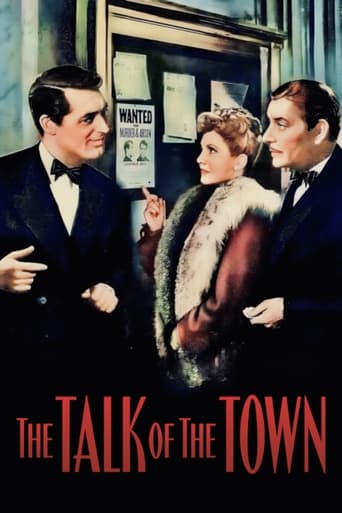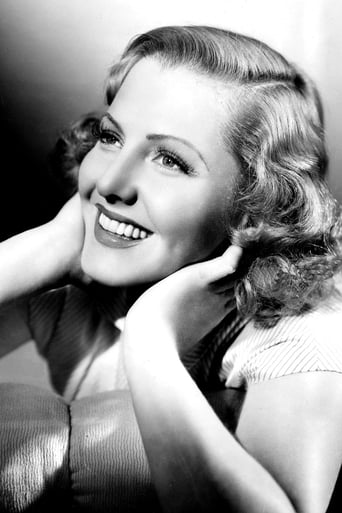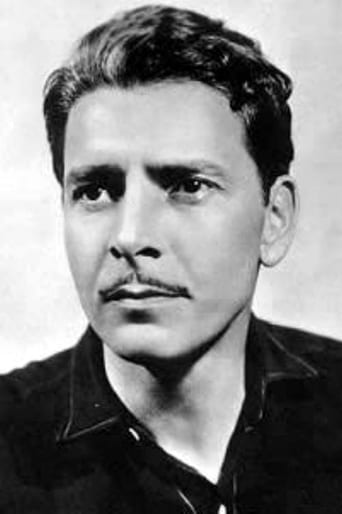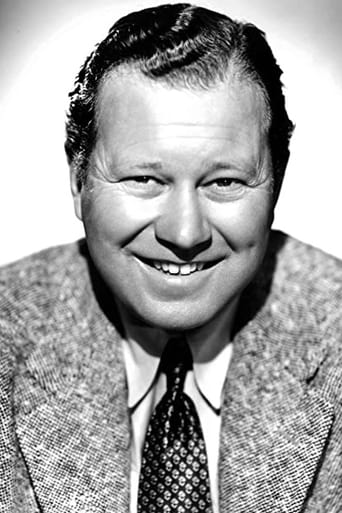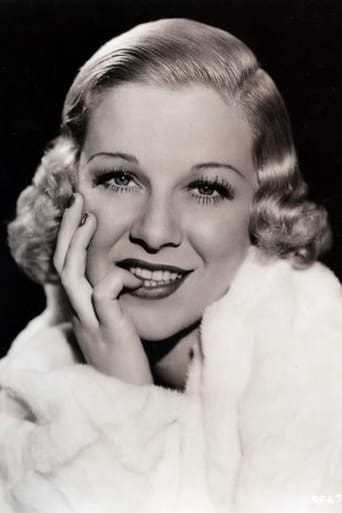Exoticalot
People are voting emotionally.
Grimossfer
Clever and entertaining enough to recommend even to members of the 1%
KnotStronger
This is a must-see and one of the best documentaries - and films - of this year.
Humaira Grant
It’s not bad or unwatchable but despite the amplitude of the spectacle, the end result is underwhelming.
Antonius Block
A strong cast with two leading men, comedic moments, and intelligent commentary on justice in America all make this a very good film. Cary Grant is a man in jail in a small town on trumped up arson charges, and Ronald Colman is an eminent legal mind who is just arriving there to work on a book. Grant escapes to the home of his old friend Jean Arthur, and Colman shows up the same night to begin renting it from her. Grant is hidden away in the attic for awhile, but soon strikes up a friendship with Colman while pretending to be Arthur's gardener, and the pair engage in some interesting debates on justice and the law. Colman represents the viewpoint of the dispassionate letter of the law, while Grant cautions that such thought is too idealistic for the way justice is often administered. As a mob has been whipped up into a frenzy against him by the local corrupt businessman whose factory burned down, he ought to know. Grant and Colman are given equal chance to charm us and shine, and they do. Arthur more than keeps up them, delivering her lines so naturally, and she's delightful. The film keeps us guessing as to who she may end up with, as both men are attractive in their own way. I loved seeing a little bit of darkness and danger in Grant here, as well as moments of charm, such as when he widens his eye and assures Arthur that they won't recognize him from the photograph on a Wanted poster, because they hadn't captured his spirit. The film gets a little heavy-handed in some of its messaging as the film plays out, but I was swayed by just how relevant it is in the times of today's populism. The danger of the mob being manipulated by someone who is corrupt (how can one not think of 'lock her up' while watching that today?), the danger of rushing to judgment instead of listening to the facts and the evidence, and the need to fight for principles were certainly appropriate in 1942, but they're also timeless. Rex Ingram is strong as Colman's servant, including a moment where he gets choked up watching Colman shave off his beard. It seemed a rather odd to me at the time, but since it means Colman is going to fight for justice in this particular case, going against the mob, it may be that Ingram relates this to countless mobs lynching African-Americans, with no one standing up for them. The film has a few moments where you have to suspend disbelief, but I enjoyed it for its intelligence, and added dimension to what otherwise would have been a standard comedy or romantic comedy. It's a film that will charm you one moment, and make you think the next, and that's not bad.Here's a quote from Colman's speech to the mob:
"This is your law and your finest possession - it makes you free men in a free country. Why have you come here to destroy it? If you know what's good for you, take those weapons home and burn them! And then think... think of this country and of the law that makes it what it is. Think of a world crying for this very law! And maybe you'll understand why you ought to guard it. Why the law has got to be the personal concern of every citizen. To uphold it for your neighbor as well as yourself. Violence against it is one mistake. Another mistake is for any man to look upon the law as just a set of principles. And just so much language printed on fine, heavy paper. Something he recites and then leans back and takes it for granted that justice is automatically being done. Both kinds of men are equally wrong! The law must be engraved in our hearts and practiced every minute to the letter and spirit. It can't even exist unless we're willing to go down into the dust and blood and fight a battle every day of our lives to preserve it. For our neighbor as well as ourself!"Hallelujah.
mmallon4
As a political junkie its fun to watch films like The Talk of the Town and dissect their deeper political and philosophical meaning which in this case is intertwined within a screwball farce that effortlessly transitions between wacky comedy and serious drama. The movie centres on a fantastic triangle of characters played by Jean Arthur, Cary Grant and Ronald Coleman with the real meat of the film being the relationship between Leopold Dilg (Grant) and Professor Michael Lightcap (Coleman) while Miss Nora Shelley (Jean Arthur) tries to keep this unlikely family of three in one piece.Leopold Dilg is one of the more interesting characters Cary Grant ever played, a radical activist and one role in which we see him dressed just like a commoner. However he is one handsome activist at that rather than some hair dyed SJW (that man can make any clothes look dapper). If it weren't for the production code then the character of Dilg would certainly be labelled as a communist. The movie is full of clues pointing to this (educated young working class intellectual, opposes capitalist corruption, belief that violence is sometimes necessary, his father's resentment for work, even his fondness for borscht). The production code would not have allowed a possible communist to be sympathetic character or a hero thus the word "communist" or related term is never mentioned. On the other hand Dilg is shown to have much respect for the Supreme Court so is he really a communist of just a leftie? With Dilg we even get an insight into why one might be an activist; as he puts it, activism is a form of self expression – "Some people write books, some music. I make speeches on street corners." Dilg would have felt right at home in the age of the internet ("When I hear a man talk nonsense I always get an impulse").Ronald Coleman, one of Hollywood's most charming English gents is Professor Lightcap. Dilg and Lightcap are two intellectuals but from different worlds in this clash of the classes yet they find common ground in their interest in the political and philosophical; their conversations and so much fun to listen and make the film worth watching again as they're a lot to take in. Dilg views Lightcap as "an intelligent man, but cold" with "no blood in his thinking" and thus doesn't desire to see him take a seat in the Supreme Court with his current mentality. By the end of the film both Dilg and Lightcap change their philosophies on law. Dilg comes around the see the need for law and order while Lightcap begins to see that the law is not sterile. During the film's final monologue Lightcap speaks to an anger mob at a courthouse on the importance of law:"This is your law and your finest possession. It makes you free. Why have you come to destroy it? Think of a world crying for this law. Then they'll understand why they ought to guard it and why the law should be the concern of every citizen, to uphold it for your neighbour as well as yourself. Violence against it is one mistake; another mistake is to look upon the law as just asset of principles. Just so much language printed on heavy paper. Something he recites and then takes it for granted that justice is being done. Both kinds of men are equally wrong. The law must be practiced every minute, to the letter and the spirit. It can't exist unless we fight a battle every day to preserve it."I'm not sure what message to take from The Talk of the Town. On the one hand it showcases the importance of upholding a lawful and just society (which would have resonated with the war against fascism in Europe) and the dangers of mob mentality. On the other hand earlier in the film Lightcap spoke of how "If feelings had any influence on the law, half the country would be in jail" and "you conduct your law on random sentimentality and you will have violence and disorder" only to later soften these views as evident by his final monologue. These statements sound just like a description of the PC politics of the 21st century; facts don't care about your feelings. Just how far will the professor go with this change of heart? Still at the end of the day it is thought provoking stuff.The character of Tilney (Rex Ingram) is one of the better, more dignified portrayals of an African American as Professor Lightcap's servant of whom he considers Tilney's judgement to be superior to his own. In one of the more unusual but emotionally powerful scenes in the movie, Tilney sheds a tear in an extreme and long close up at the sight of his master shaving his beard; a black actor having a long close up with real emotion behind it. The scene plays the emotions up to 11 as Tilney realises his friend and employer is undergoing a profound change as he shaves his beard as a metaphor for casting off old ways.The beginning of The Talk of the Town is incredibly different from the rest of the film, setting it up as a horror/thriller with its moody, melodramatic music and making Dilg out to be a sinister, threatening character. If you went into the film completely blind you would be shocked as it gradually morphs into a comedy as the lighting and shadows becomes less dim, the music becomes more cheery and starts to take on a pleasant New England, small town feel. Likewise listen out for a piece of music heard throughout the film including at the end which sounds just like Yoda's them from The Empire Strikes Back.
SimonJack
"The Talk of the Town" has a unique plot and very interesting story. The comedy in this very clever movie isn't in the usual forms of witty dialog or antics. The situations play to some extent. But much of the film is sophisticated comedy. The type that is placed on a high plain of discussion. The cast is superb. The principals in that are Cary Grand as Leopold Dilg and Ronald Colman as Professor Michaela Lightcap, with an occasional inclusion of Edgar Buchanan as Sam Yates. Most of the rest of the comedy is situational and provided by Jean Arthur as Nora Shelley. She, naturally, would be the source of romance in a triangle. To know much of the plot of this film will reduce its enjoyment, so I'll skip any further details. But the discussion of justice and the court system at times is philosophic and insightful, and at other times, seemingly far-fetched. With that, the film has almost a preachy aspect about it – trumpeting freedom and the American way for patriotism. This is another film that has an interesting and humorous courtroom scene. Here's a sample of humorous lines in the film. Lghtcap, "Miss Shelly, judging from the past 12 hours, how quiet do you think it could be in this house, with you in it?"Not everyone will enjoy this movie. It's not one to sit down to watch lazily. It takes some thought. But the interesting dialog between Dilg and Lightcap is offset by the actions of Shelley. This is among Jean Arthur's best performances, in my book.
Qanqor
There's a lot of great things in this film, but they don't add up to a great film. In this case, the total is less than the sum of its parts.The problem really is that the movie can't make up its mind what it's trying to be. It's a drama and a comedy and a romance and a message film, and by trying to be all those things, it succeeds well at none of them.As a comedy, it is ruined by the drama. The movie starts out so serious and heavy, that we get in a serious, heavy mood, and start really caring about the plot-- which is death for a comedy. So when various shenanigans start happening, it's hard to let loose and laugh at them, because we're still worried about how it affects the plot and if the hero will get caught.As a romance, it's almost a complete dud. What we have here is a classic lovers triangle, and while all three leads are very good dramatically and comedically, there's really very little chemistry between either male lead and the heroine. It's a sad commentary on the romance when the most interesting relationship is the hypotenuse-- Grant and Coleman's budding friendship has much more chemistry than either man with the woman. The only good thing I'll say about the romance aspect of the film is that it did do a good job of keeping you guessing about which gentleman she'd end up with.Drama is perhaps the films strongest suit, but even here it comes up short. The story is interesting and engrossing, and again, the leads do a fine job. But because so much of the film is expended on the other aspects, the overall dramatic story is pretty sparse and sketchy. The chief villain, the factory owner, is more a prop than a character; we never do really find out exactly what his scheme or motivations were, or see him actually get some comeuppance. We have no idea what the allegedly strong evidence against the hero was supposed to be-- indeed, it's hard to see how they had any case against Grant at all.And as for the message, well, it's so short on details that it's not much of a message at all. This is no Atlas Shrugged in terms of trying to get a philosophy across. The whole theory-of-law thing works best to simply show the developing intellectual engagement leading to the friendship between the two male leads.So I find the film hard to heartily enjoy. Yet despite all my criticism, I gave it a pretty good rating. Because there is a lot that's very good here. Good dialog, good performances, some of the comedy really is pretty good. It's just that, as I said, it doesn't all add up very well.But I am going to try my borscht with an egg beaten into it one of these days!
